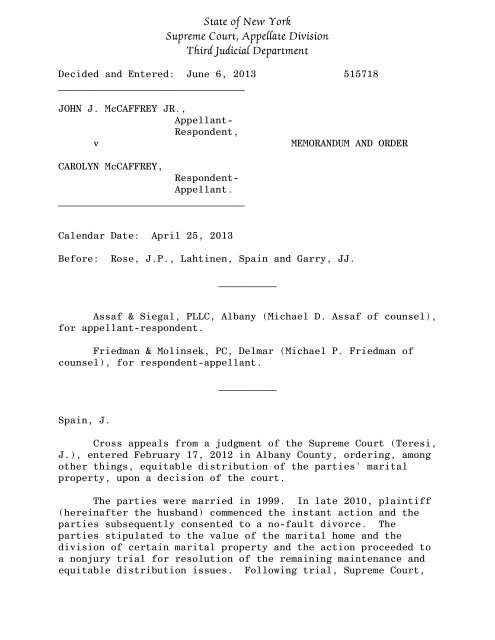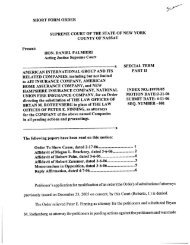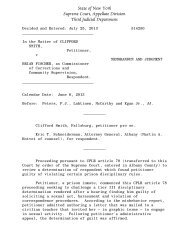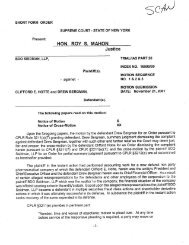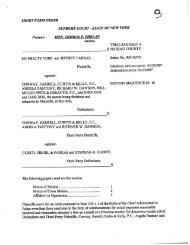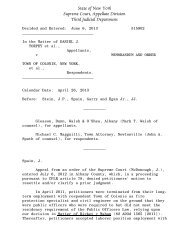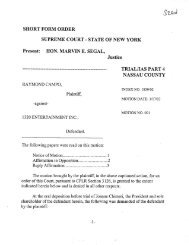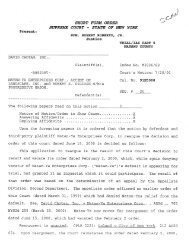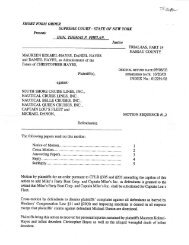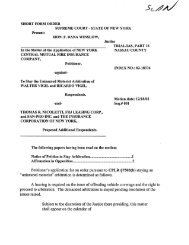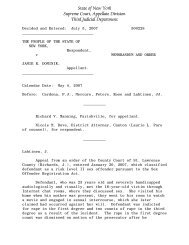515718 McCaffrey v McCaffrey
515718 McCaffrey v McCaffrey
515718 McCaffrey v McCaffrey
You also want an ePaper? Increase the reach of your titles
YUMPU automatically turns print PDFs into web optimized ePapers that Google loves.
State of New York<br />
Supreme Court, Appellate Division<br />
Third Judicial Department<br />
Decided and Entered: June 6, 2013 <strong>515718</strong><br />
________________________________<br />
JOHN J. McCAFFREY JR.,<br />
Appellant-<br />
Respondent,<br />
v<br />
MEMORANDUM AND ORDER<br />
CAROLYN McCAFFREY,<br />
Respondent-<br />
Appellant.<br />
________________________________<br />
Calendar Date: April 25, 2013<br />
Before: Rose, J.P., Lahtinen, Spain and Garry, JJ.<br />
__________<br />
Assaf & Siegal, PLLC, Albany (Michael D. Assaf of counsel),<br />
for appellant-respondent.<br />
Friedman & Molinsek, PC, Delmar (Michael P. Friedman of<br />
counsel), for respondent-appellant.<br />
__________<br />
Spain, J.<br />
Cross appeals from a judgment of the Supreme Court (Teresi,<br />
J.), entered February 17, 2012 in Albany County, ordering, among<br />
other things, equitable distribution of the parties' marital<br />
property, upon a decision of the court.<br />
The parties were married in 1999. In late 2010, plaintiff<br />
(hereinafter the husband) commenced the instant action and the<br />
parties subsequently consented to a no-fault divorce. The<br />
parties stipulated to the value of the marital home and the<br />
division of certain marital property and the action proceeded to<br />
a nonjury trial for resolution of the remaining maintenance and<br />
equitable distribution issues. Following trial, Supreme Court,
-2- <strong>515718</strong><br />
among other things, distributed the parties' marital debt to the<br />
husband, awarded defendant (hereinafter the wife) maintenance and<br />
a portion of the husband's enhanced earnings attributable to his<br />
college degrees, and ordered the wife to reimburse the husband<br />
for certain mortgage payments that accrued during the pendency of<br />
the action. The husband now appeals and the wife cross-appeals.<br />
The husband first argues that Supreme Court abused its<br />
discretion by awarding the wife maintenance, which he contends is<br />
excessive and unwarranted in light of the wife's ability to be<br />
self-supporting and because, he argues, the court improperly<br />
found that he had wastefully dissipated marital assets. Viewing<br />
the record in its totality, we agree. "[T]he primary purpose of<br />
maintenance is to encourage self-sufficiency by the recipient"<br />
(Quinn v Quinn, 61 AD3d 1067, 1071 [2009]; accord Biagiotti v<br />
Biagiotti, 97 AD3d 941, 942 [2012]), and "[m]aintenance is<br />
appropriate where . . . the marriage is of long duration, the<br />
recipient spouse has been out of the work force for a number of<br />
years, has sacrificed her or his own career development or has<br />
made substantial noneconomic contributions to the household or to<br />
the career of the payor" (Ndulo v Ndulo, 66 AD3d 1263, 1265<br />
[2009]; see Williams v Williams, 99 AD3d 1094, 1095 [2012]).<br />
Here, the parties' marriage was not of particularly long duration<br />
(12 years), and they had no children together. When this action<br />
was commenced, the husband was 52 years old and the wife was 42<br />
years old. Both parties were in good health and were gainfully<br />
employed, with the husband earning an annual salary of<br />
approximately $113,000 and the wife earning an annual salary of<br />
$65,000 (compare Williams v Williams, 99 AD3d at 1095-1096). In<br />
addition, the wife had separate property consisting of $66,000 in<br />
a trust account and $27,000 in savings bonds, both of which she<br />
testified were in her name but had been set aside by her parents<br />
for their elder care. Supreme Court found that both parties were<br />
self-supporting, and they stipulated to an equal division of<br />
their retirement and deferred compensation plans and neither<br />
party lost health insurance as a result of the divorce.<br />
The wife correctly notes that "[t]he fact that [she] has<br />
the ability to be self-supporting by some standard of living does<br />
not mean that she is self-supporting in the context of the<br />
marital standard of living" (Ndulo v Ndulo, 66 AD3d at 1265; see
-3- <strong>515718</strong><br />
Williams v Williams, 99 AD3d at 1096). However, "[t]he<br />
determination of an appropriate maintenance award requires[,<br />
among other things,] a delicate balanc[e] of each party's needs<br />
and means [or ability to pay]" (Mairs v Mairs, 61 AD3d 1204, 1208<br />
[2009] [internal quotation marks and citation omitted]; see<br />
Domestic Relations Law § 236 [B] [6] [a]; McAuliffe v McAuliffe,<br />
70 AD3d 1129, 1134 [2010]; Lorenz v Lorenz, 63 AD3d 1361, 1363<br />
[2009]; Gaglio v Molnar-Gaglio, 300 AD2d 934, 939 [2002]). The<br />
record demonstrates that the parties' relatively high predivorce<br />
standard of living would not have been sustainable without the<br />
significant credit card debt. Indeed, the parties refinanced the<br />
marital residence, relying on much of its equity to reduce their<br />
debt. In our view, Supreme Court gave inadequate consideration<br />
to the balancing of the wife's needs – for which her own salary<br />
should provide adequate support – with the husband's ability to<br />
pay (see Domestic Relations Law § 236 [B] [6] [a]).<br />
Moreover, the husband's alleged wasteful dissipation of<br />
marital assets as a ground for awarding maintenance is not<br />
supported by the record. The husband's minor legal expenses<br />
(around $1,100) associated with his defense of a criminal charge<br />
did not constitute wasteful dissipation of marital assets (see<br />
Kohl v Kohl, 24 AD3d 219, 219 [2005]). The record also<br />
demonstrates that the husband's expenditures on his paramour and<br />
their child – who was conceived during the husband's marriage to<br />
the wife and born while this action was pending – were incurred<br />
after the date of commencement. Furthermore, the record reflects<br />
that the husband gambled only a few times during the parties'<br />
marriage, spent no more than $2,000 and broke even on all<br />
accounts, which does not rise to the level of wasteful<br />
dissipation (see Treffiletti v Treffiletti, 252 AD2d 635, 636-637<br />
[1998]; compare Burnett v Burnett, 101 AD3d 1417, 1419 [2012]).<br />
Although the wife accused the husband of incurring significant<br />
credit card debt without her knowledge, he testified that all of<br />
the charges – including those on his personal credit cards – were<br />
made for marital, household and work-related expenses. The wife<br />
did not rebut this testimony and, thus, the parties' credit card<br />
debt, including that charged on the husband's credit cards, was<br />
marital debt rather than wasteful dissipation of marital assets<br />
(see Biagiotti v Biagiotti, 97 AD3d at 943-944; Evans v Evans, 55<br />
AD3d 1079, 1081 [2008]).
-4- <strong>515718</strong><br />
While "[t]he amount and duration of [a maintenance] award<br />
are addressed to the sound discretion of the trial court" (Murray<br />
v Murray, 101 AD3d 1320, 1322 [2012], lv dismissed 20 NY3d 1085<br />
[2013]; see Domestic Relations Law § 236 [B] [6] [a]), "this<br />
Court's authority is as broad as Supreme Court's in resolving<br />
questions of maintenance" (Quinn v Quinn, 61 AD3d at 1071<br />
[internal quotation marks and citations omited]). Accordingly,<br />
we find that under the circumstances of this case – where the<br />
marriage was not of particularly long duration, the parties had<br />
no children, the wife has stable employment that provides her a<br />
significant salary, the wife is not losing retirement or health<br />
benefits and the parties' predivorce standard of living was<br />
falsely inflated by overextended lines of credit – the statutory<br />
factors do not support an award of maintenance (see Domestic<br />
Relations Law § 236 [B] [6] [a] [1]-[20]; Gandhi v Gandhi, 283<br />
AD2d 782, 786 [2001]).<br />
We further agree with the husband that Supreme Court erred<br />
by ordering him to pay the wife $37,110 – half of the money that<br />
the parties borrowed against their equity in their marital<br />
residence. In 2010, the parties refinanced the marital residence<br />
and borrowed approximately $74,000 against that equity to pay<br />
their outstanding credit card balances. While the wife denied<br />
knowledge of or complicity in the extent of the parties' credit<br />
card debt, she admitted that the husband discussed the refinance<br />
with her, she signed the refinance application and agreement –<br />
which listed the balances owed on each card – and she agreed to<br />
refinance in order to pay off their credit cards. Supreme Court<br />
found that the husband took the proceeds of this refinance and<br />
spent it entirely on personal expenses, gambling and his paramour<br />
and, as a result, it ordered him to pay the wife half of the<br />
refinance proceeds. However, the parties' credit card statements<br />
establish – and the wife does not dispute – that the refinancing<br />
proceeds were actually used by the husband to pay off the<br />
1<br />
outstanding marital credit card balances. Accordingly, the<br />
1<br />
The husband applied the proceeds of the refinancing to<br />
the balances of the credit cards as follows: (1) $4,966 to one<br />
account; (2) $27,617.14 to another; (3) $15,600 to another; and<br />
(4) $24,079.18 to another.
-5- <strong>515718</strong><br />
court's award of 50% of the monies used by the husband to pay off<br />
the parties' credit card debt to the wife – debt that was<br />
2<br />
actually no longer owed – was error (see Biagiotti v Biagiotti,<br />
97 AD3d at 943-944; Corbett v Corbett, 6 AD3d 766, 768 [2004];<br />
Spenello v Spenello, 274 AD2d 822, 825 [2000]).<br />
We discern no error in Supreme Court's distribution of the<br />
enhanced earning capacity created by the husband's two college<br />
degrees, and reject the husband's arguments that the wife failed<br />
to prove that the degrees resulted in enhanced earnings or that<br />
3<br />
she substantially contributed to their attainment. To be<br />
entitled to a share of the value of the husband's degrees, the<br />
wife "must demonstrate that the degree[s] enhanced [the<br />
husband's] earning capacity and that she, in a meaningful and<br />
substantial way, contributed to his efforts in obtaining [them]"<br />
(Evans v Evans, 55 AD3d at 1080; see McAuliffe v McAuliffe, 70<br />
AD3d at 1136). During the marriage, the husband earned an<br />
Associate's degree in telecommunications and a Bachelor's degree<br />
in business administration with a minor in accounting. He<br />
received numerous promotions throughout the marriage, eventually<br />
holding the title of director of a department relevant to his<br />
degrees; the husband argues that these promotions were not<br />
attributable to his degrees and that Supreme Court should have<br />
found that the degrees did not enhance his earnings at all.<br />
Richard Jones, a jointly retained consultant, opined that<br />
the value of the enhanced earnings attributable to the husband's<br />
degrees at the date of commencement was $204,000. Supreme Court<br />
found that 25% ($51,000) of that value constituted separate<br />
2<br />
The parties each accrued additional credit card debt<br />
after the commencement of this action that does not qualify as<br />
marital debt and is not subject to equitable distribution (see<br />
Domestic Relations Law § 236 [B] [1] [c]; Zwickel v Szajer, 45<br />
AD3d 1222, 1224 [2007]).<br />
3<br />
In light of our elimination of the maintenance award, we<br />
need not address the husband's arguments with respect to whether<br />
Supreme Court erred under Grunfeld v Grunfeld (94 NY2d 696<br />
[2000]) by failing to conduct a double dipping analysis.
-6- <strong>515718</strong><br />
property and, further, that only 50% ($76,500) of the husband's<br />
enhanced earning potential was traceable to his degrees. The<br />
court awarded the wife 15% of that amount, totaling $11,475. In<br />
addition to Jones' expert opinion, evidence of the enhanced<br />
earnings included an evaluation in his personnel file that<br />
remarked on the beneficial effect that his degrees had on his<br />
employment and the fact that he included his degrees on every<br />
promotion application. Although two witnesses from the husband's<br />
employment testified that his degrees were not required for his<br />
promotions and that his promotions were mostly attributable to<br />
his superior job performance, neither witness testified that his<br />
degrees were not a factor in his promotions (compare Evans v<br />
Evans, 55 AD3d at 1080). Accordingly, Supreme Court "arrive[d]<br />
at [a] determination[] that w[as] supported by the credible<br />
evidence introduced at trial" (McAuliffe v McAuliffe, 70 AD3d at<br />
1137 [internal quotation marks and citation omitted]).<br />
Nor do we agree with the husband that the wife failed to<br />
prove that she contributed in a substantial way to his attainment<br />
of the degrees, which depends on whether she "altered . . . her<br />
schedule and/or took on additional household duties that . . .<br />
she would not have otherwise performed, in order to enable [the<br />
husband] to obtain the . . . degree[s]" (Quarty v Quarty, 96 AD3d<br />
at 1277; see Sadaghiani v Ghayoori, 83 AD3d 1309, 1310 [2011]).<br />
The wife testified that while the husband was in school, she<br />
rearranged her schedule, transported him to and from classes, and<br />
assumed a greater share of the household responsibilities, and<br />
she averred that part of the husband's tuition was paid for by<br />
marital funds. Accordingly, we cannot say that Supreme Court<br />
abused its discretion in finding that the wife contributed to the<br />
husband's degrees (see Sadaghiani v Ghayoori, 83 AD3d at 1311;<br />
Carman v Carman, 22 AD3d 1004, 1007 [2005]).<br />
The wife's assertion that Supreme Court erroneously<br />
distributed to her only a limited percentage of the husband's<br />
enhanced earning value is likewise without merit. "[W]here only<br />
modest contributions are made by the nontitled spouse toward the<br />
other spouse's attainment of a degree . . . and the attainment is<br />
more directly the result of the titled spouse's own ability,<br />
tenacity, perseverance and hard work, it is appropriate for<br />
courts to limit the distributed amount of that enhanced earning
-7- <strong>515718</strong><br />
capacity" (Esposito-Shea v Shea, 94 AD3d 1215, 1217 [2012]<br />
[internal quotation marks and citation omitted]). The husband<br />
expended significant effort in obtaining his degrees; he attended<br />
night classes while working full time, and occasionally at a<br />
part-time second job. Moreover, much of his professional success<br />
was attributable to his superior job performance. Thus, Supreme<br />
Court's limited distribution to the wife of only 15% of the<br />
enhanced earnings was well within its discretion (see<br />
Esposito-Shea v Shea, 94 AD3d at 1217; Sadaghiani v Ghayoori, 83<br />
AD3d at 1311; Carman v Carman, 22 AD3d at 1006).<br />
Regarding the mortgage payments, it was error to order the<br />
wife to reimburse the husband for the full amount of the monthly<br />
mortgage payments through the pendency of this action. The wife<br />
moved out of the residence in late November 2010, prior to the<br />
commencement of this action; from that point on, the husband, his<br />
paramour and their child together had exclusive use and occupancy<br />
of the home. Accordingly, the husband should only be reimbursed<br />
for "one half of the amount by which the mortgage principal has<br />
been reduced" (Redgrave v Redgrave, 13 AD3d at 1018; see Le v Le,<br />
82 AD3d 845, 846 [2011]; Arnold v Arnold, 309 AD2d 1043, 1045<br />
[2003]).<br />
Additionally, the parties' 180,000 American Express reward<br />
points that were accumulated during the marriage should have been<br />
distributed equally between them (see Domestic Relations Law<br />
§ [B] [5] [c]; Hale v Hale, 16 AD3d 231, 235 [2005]). Finally,<br />
in light of our other findings, the wife now may be entitled to<br />
counsel fees (see Domestic Relations Law § 237 [a]), which<br />
Supreme Court denied. We therefore remit to Supreme Court for<br />
reconsideration of whether such an award would be appropriate.<br />
The parties' remaining contentions have been examined and<br />
we find that further modification is not warranted.<br />
Rose, J.P., Lahtinen and Garry, JJ., concur.
-8- <strong>515718</strong><br />
ORDERED that the judgment is modified, on the law and the<br />
facts, without costs, by reversing so much thereof as (1) awarded<br />
defendant maintenance, (2) awarded defendant $37,100 as<br />
reimbursement for the refinancing proceeds, and (3) awarded<br />
plaintiff a credit for the mortgage payments of $1,710 per month<br />
between December 2010 and February 2012; award plaintiff only one<br />
half of the amount by which the mortgage principal was reduced<br />
between December 2010 and February 2012 and award defendant one<br />
half of the American Express reward points, and matter remitted<br />
to the Supreme Court for further proceedings not inconsistent<br />
with this Court's decision; and, as so modified, affirmed.<br />
ENTER:<br />
Robert D. Mayberger<br />
Clerk of the Court


